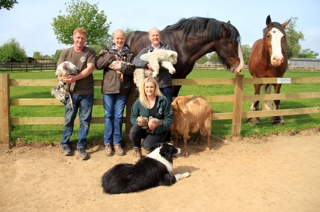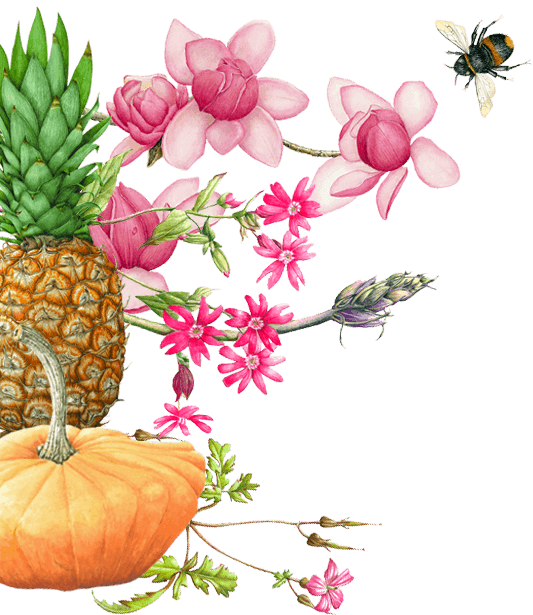First Rare Breed Farm Park in South West!
- 12th Jun 2018
The world famous Lost Gardens of Heligan is proud to have been awarded Rare Breed Farm Park status by the Rare Breeds Survival Trust, making it the first rare breeds park in the whole of the South West!
It all started 30 years ago, not long after Tim Smit and family had relocated to Cornwall, when the family’s first trip to the county’s Royal Cornwall Show turned into a pivotal moment.
“We spent most of the day captivated by the Rare Breeds Tent and its inhabitants, all of us dreaming about our new home in the country and the opportunity to have our own menagerie. A few weeks later we gave our daughter Laura, who had just turned six, three chickens. The following year we got her an incubator where she happily played midwife to her ever increasing brood of chicks! Not long after that we jumped at the chance to rehome two pot-bellied pigs, Horace and Doris. It was the start of a lifelong love affair of rare breed animals for both Laura and Tim” – Candy Smit
Whilst searching for land to home his vision of a Rare Breeds Park, Tim came across the gardens and estate at Heligan. The discovery of the gardeners’ names on the wall of the Thunderbox Room along with the date 1914 changed the course of travel and Tim was fired by a passion to restore the gardens ‘In their name’; in celebration of the lost gardeners and horticultural practices and plants of a bygone era. The Lost Gardens of Heligan were re-born and developed to become Europe’s largest garden restoration as well as the ‘Nation’s Favourite Garden’.
Twenty six years later and restoration is still at the heart of The Lost Gardens where today’s team embody the philosophy of ‘preserving the past to protect the future’. This can be appreciated through the biodiversity of the gardens and the celebration of growing over 500 varieties of heritage fruit, flower, vegetable and herb. Restoration of Heligan’s historic estate has run alongside the restoration of the gardens with ancient woodlands, pasture and wetland all being managed in traditional ways with low impact grazing and an increasing collection of rare breed animals; again highlighting the historic breeds that would have once blessed our countryside.
Although rare breeds may have fallen out of favour with the meat and dairy industry as more modern breeds prove more economic in production the UK are is seeing a resurgence in appreciation of more unusual meats on the plates of many of country’s top restaurants.
“The only reason farmers will keep them is if we start eating them,” says Tom Beeston, the head of the RBST and a farmer. “High consumer demand for cheap meat has led to the agricultural industry choosing breeds that fatten quickly through intensive feeding. Rare breeds take more time to grow and therefore cost more to feed. However each native breed of animal if kept outside, will be consuming varied plants and eating different things. This means that all breeds then produce meat that differs in taste and texture. By keeping rare breed native livestock, you instantly offer your consumer a variety of tastes, which are certainly not found in the supermarket!”
Alongside this change in taste appreciation runs an understanding of the importance of keeping rare breeds alive and their important and relevant role within the countryside.
The UK's native livestock breeds preserve unique genetic biodiversity, allow further breed development for commercial farming, and are important to the public in sustaining landscape and communities. Some of the UK's most beautiful landscapes and their geodiversity have been developed over centuries with our native breeds and these adapted breeds help farmers sustain these environments. These breeds are internationally recognised and constitute some of our most valuable natural assets.
Traditional native breeds are a symbol of the UK's national heritage, but are unfortunately often deemed less important compared to historic buildings, native wildlife, landscapes or rare plants. Ironically, historical agricultural fortunes funded these buildings, current landscape appearance and the survival of much flora actually depends on these relatively neglected rare breeds of native livestock.
It is important that these breeds, these genetic assets and our biodiversity is acknowledged or it will be reduced and our heritage be lost to future generations. Heligan supports our native breeds, as they give so much to our food chain, biodiversity, conservation grazing, tourism and landscape development.
“The Lost Gardens are now home to 18 rare and native breeds of livestock and over 20 breeds of poultry. Our livestock is chosen not only for its appearance and gentle nature but also for its ability to complete a job around our estate, as well as to provide a variety of tastes and meat for the Heligan Kitchen. If you explore our landscape you will find Lop pigs housed within our woodland, working hard to clear the brambles, Cornwall & Devon Longwool sheep and White Park cattle grazing our hay meadows, promoting the growth of wild flowers and habitats for a variety of wildlife. We use our shire horses to work the land, to plough the fields and to pull logs from our woodland. The use of traditional farming techniques allows us to take care of our estate and manage it with care and with non-invasive natural methods, whilst also allowing our animals to exercise their natural behaviours in full bloom!”. – Laura Smit, Heligan Livestock Experience Co-ordinator
Heligan’s accreditation and collaboration with the RBST will also mean that visitors to the gardens will get to witness the next generation of rare breeds coming into the world as Heligan begins a breeding programme.
“Heligan is proud to be actively participating within RBST approved conservation breeding programmes for some of our rare breeds. So far, we have birth notified and registered our new born’s from the Devon and Cornwall long wools, British Lop and Tamworth pigs, and our White park cattle. We look forward to extending the breeds that we are registering during 2018, with our first beautiful Berkshire piglets having recently arrived on Home Farm and due to be registered soon. By registering the new born’ with their breed societies, we are taking an active role in assisting the collection of data that guides the formation of each breeds conservation status each year. This data communicates the number of breeding females in the UK of each breed, that have met the breed societies set standards of being a true example of the breed. We are excited to also be planning to sell some of our registered young stock, so to assist with increasing the numbers of breeding females within these breed groups and supporting the conservation of these animals.” – explains Laura
Additional Notes -
To achieve Farm Park status, Heligan was required to show that they could fit the clear and comprehensive criteria, as set and assessed by RBST representatives. This criteria included being able to show best practice in animal husbandry, data capture, stock movement recording, staff knowledge and ability, visitor engagement and education, animal welfare, and park presentation, as well as showing active participation in breeding programmes of rare breed livestock. Having successfully fulfilled the criteria, we are honoured to now be added to the list of 22 other accredited farm parks and to continue our work to develop and grow Heligan's Home Farm. Heligan has been home to many rare and native protected plants for years and has taken great care in protecting them and showcasing them to our visitors. We feel just as passionately about our native livestock and the rare breeds that once inhabited Home Farm and look forward to telling their stories and contributing to a protected future of these heritage breeds.


